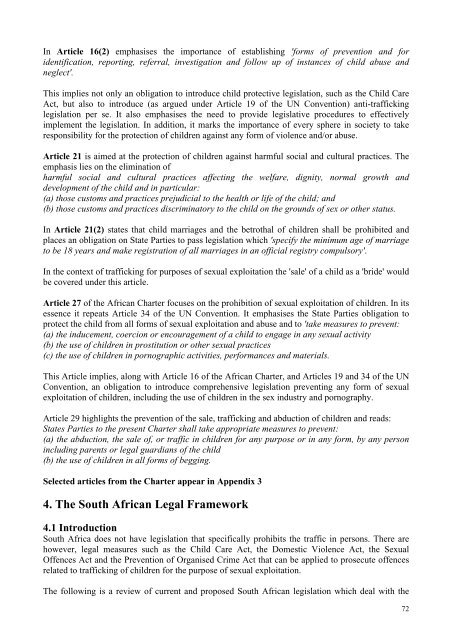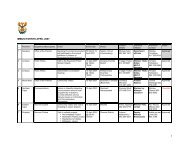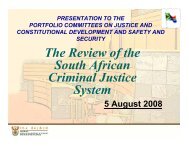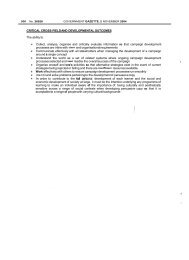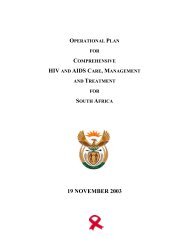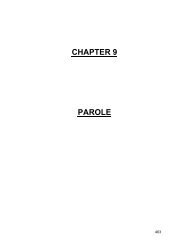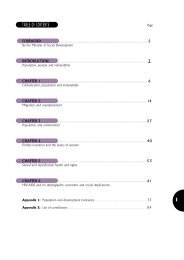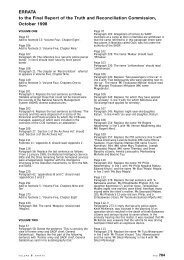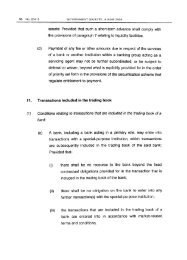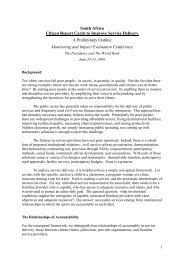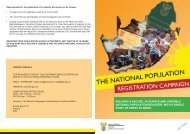The trafficking of children for purposes of sexual exploitation
The trafficking of children for purposes of sexual exploitation
The trafficking of children for purposes of sexual exploitation
You also want an ePaper? Increase the reach of your titles
YUMPU automatically turns print PDFs into web optimized ePapers that Google loves.
In Article 16(2) emphasises the importance <strong>of</strong> establishing '<strong>for</strong>ms <strong>of</strong> prevention and <strong>for</strong><br />
identification, reporting, referral, investigation and follow up <strong>of</strong> instances <strong>of</strong> child abuse and<br />
neglect'.<br />
This implies not only an obligation to introduce child protective legislation, such as the Child Care<br />
Act, but also to introduce (as argued under Article 19 <strong>of</strong> the UN Convention) anti-<strong>trafficking</strong><br />
legislation per se. It also emphasises the need to provide legislative procedures to effectively<br />
implement the legislation. In addition, it marks the importance <strong>of</strong> every sphere in society to take<br />
responsibility <strong>for</strong> the protection <strong>of</strong> <strong>children</strong> against any <strong>for</strong>m <strong>of</strong> violence and/or abuse.<br />
Article 21 is aimed at the protection <strong>of</strong> <strong>children</strong> against harmful social and cultural practices. <strong>The</strong><br />
emphasis lies on the elimination <strong>of</strong><br />
harmful social and cultural practices affecting the welfare, dignity, normal growth and<br />
development <strong>of</strong> the child and in particular:<br />
(a) those customs and practices prejudicial to the health or life <strong>of</strong> the child; and<br />
(b) those customs and practices discriminatory to the child on the grounds <strong>of</strong> sex or other status.<br />
In Article 21(2) states that child marriages and the betrothal <strong>of</strong> <strong>children</strong> shall be prohibited and<br />
places an obligation on State Parties to pass legislation which 'specify the minimum age <strong>of</strong> marriage<br />
to be 18 years and make registration <strong>of</strong> all marriages in an <strong>of</strong>ficial registry compulsory'.<br />
In the context <strong>of</strong> <strong>trafficking</strong> <strong>for</strong> <strong>purposes</strong> <strong>of</strong> <strong>sexual</strong> <strong>exploitation</strong> the 'sale' <strong>of</strong> a child as a 'bride' would<br />
be covered under this article.<br />
Article 27 <strong>of</strong> the African Charter focuses on the prohibition <strong>of</strong> <strong>sexual</strong> <strong>exploitation</strong> <strong>of</strong> <strong>children</strong>. In its<br />
essence it repeats Article 34 <strong>of</strong> the UN Convention. It emphasises the State Parties obligation to<br />
protect the child from all <strong>for</strong>ms <strong>of</strong> <strong>sexual</strong> <strong>exploitation</strong> and abuse and to 'take measures to prevent:<br />
(a) the inducement, coercion or encouragement <strong>of</strong> a child to engage in any <strong>sexual</strong> activity<br />
(b) the use <strong>of</strong> <strong>children</strong> in prostitution or other <strong>sexual</strong> practices<br />
(c) the use <strong>of</strong> <strong>children</strong> in pornographic activities, per<strong>for</strong>mances and materials.<br />
This Article implies, along with Article 16 <strong>of</strong> the African Charter, and Articles 19 and 34 <strong>of</strong> the UN<br />
Convention, an obligation to introduce comprehensive legislation preventing any <strong>for</strong>m <strong>of</strong> <strong>sexual</strong><br />
<strong>exploitation</strong> <strong>of</strong> <strong>children</strong>, including the use <strong>of</strong> <strong>children</strong> in the sex industry and pornography.<br />
Article 29 highlights the prevention <strong>of</strong> the sale, <strong>trafficking</strong> and abduction <strong>of</strong> <strong>children</strong> and reads:<br />
States Parties to the present Charter shall take appropriate measures to prevent:<br />
(a) the abduction, the sale <strong>of</strong>, or traffic in <strong>children</strong> <strong>for</strong> any purpose or in any <strong>for</strong>m, by any person<br />
including parents or legal guardians <strong>of</strong> the child<br />
(b) the use <strong>of</strong> <strong>children</strong> in all <strong>for</strong>ms <strong>of</strong> begging.<br />
Selected articles from the Charter appear in Appendix 3<br />
4. <strong>The</strong> South African Legal Framework<br />
4.1 Introduction<br />
South Africa does not have legislation that specifically prohibits the traffic in persons. <strong>The</strong>re are<br />
however, legal measures such as the Child Care Act, the Domestic Violence Act, the Sexual<br />
Offences Act and the Prevention <strong>of</strong> Organised Crime Act that can be applied to prosecute <strong>of</strong>fences<br />
related to <strong>trafficking</strong> <strong>of</strong> <strong>children</strong> <strong>for</strong> the purpose <strong>of</strong> <strong>sexual</strong> <strong>exploitation</strong>.<br />
<strong>The</strong> following is a review <strong>of</strong> current and proposed South African legislation which deal with the<br />
72


